What would it take to farm a more joyful future?
Spencer Scott and Nick Schwanz want you to come to their solarpunk farm and see what a regenerative future could feel like
In 1939, the World’s Fair took place in New York.
One diorama at that fair so profoundly captivated the public, you could argue it was the first domino that got us to the car-centric, hugely polluting lives of comfort and convenience we know today in the Global North. General Motors and Shell Oil teamed up with a designer to create a speculative peek into what the future could look like: a mesmerizing world of endlessly interlocking highways and huge skyscrapers with the car firmly placed at the centre of American life. The diorama was called Futurama, and rather than tell people what to be against and what to run from, as politics so often does, it offered people a vision, a thing to run toward, an individualistic fantasy made real. All they had to do was say yes.
And boy, did they ever.
What if there was a physical place you could go to embody what a sustainable, regenerative future might look and feel like?
Great news! Nick Schwanz and Spencer Scott are busy creating it right now. Prior to 2020, they were living city lives, working stable jobs – Nick was in business and communications and Spencer was in climate science; if you’re familiar with Paul Hawken’s book Regeneration: Ending The Climate Crisis In One Generation, Spencer was its director of research. And though Nick and Spencer shared profound awareness and anxiety around the climate crisis, they were also deeply entangled in capitalist ways of working and thinking.
But then a bunch of things collided in such a way that propelled them to take a wild leap into a totally new life: a new IPCC report dropped. Nick became disillusioned with the business world. A sudden pandemic got them peering into the gap between their values and their lifestyles. And in 2020, they bought a run-down horse property in Guerneville, California, moved in, and sunk their life savings into a regenerative farm that recruits visitors and friends and queer community into the process of its creation – and in so doing, gives people a physical space to wander around in, learn about sustainable farming practices, and really see and understand and feel with their hands what the future could look like if the best thing happened. At this moment in time, where the climate movement bombards us with worst-case scenarios, what a joyful, hopeful, and desperately needed gift that is.
As Nick explains: “we call it a ‘demonstration site’. That's what we want this place to be. And not just a demonstration of functional farming strategies – a demonstration of feelings and emotions and senses.”
They named it Solarpunk Farms – a challenge to the cyberpunk and steampunk movements, which say that the future holds dystopia and warn us to avoid it at all costs. “That's a stick-based policy,” Nick says. “Solarpunk takes the carrot-based policy and says, well why don't we run towards something? Why don't we say the best case is actually tomorrow and what would that look like?”
Here’s a little Q&A with Spencer and Nick.
It’s a huge mental shift from the capitalist grind to regenerative farming. What has that shift been like?
SPENCER: I took the leap with a large amount of privilege. And then the emotions caught up with me over the next few years. A lot of it was rethinking and rewriting old narratives: I was grappling with the fact that our entire system is set up to advantage certain people – people who look like me. So a lot of my perceived success and resilience turned out to be not real. When I stepped out of that system and left it behind, I started to realize, “oh, I'm not as resilient, individually, as I thought.” Because I was protected by a system that was helping me feel resilient. So it was a long process of building that internal resilience outside of my previous life.
As humans we get resilience from a lot of positive social feedback. Our entire social structure is currently built around carbon-intensive lifestyles – a luxury lifestyle is the aspiration. I was very dependent on positive social feedback from a system I no longer wanted to be a part of. And so when I stepped away from that, I started to feel estranged from my community. I don't really believe in self-sufficiency. I believe we are stronger in community. I realized that I had to start over in community – or have faith that my community would support us and see where we were coming from and join us in this new framework. But the self-alienation that can come with making these big, big leaps was the hardest part. And then there's just also the practical stuff like a job and being able to support myself and all of those things needed to be built back up again.
NICK: We had a ton of fights and a hard time at the very beginning, because idealism and pragmatism were really in conflict for those first early years. And now four years in, we’ve made a lot of growth and we've made a lot of sacrifices and we've learned how to come to the middle. Having this farm as a shared vision was super-important. And I think one of the superpowers we have as a couple is the ability to have super-open, honest conversations about our mental health all the time. I don't think it's innate. I think it's something we've worked on. We are our own therapists in a lot of ways.
SPENCER: I hope I'm not overstepping my bounds, but I think there's something easier about same-gender couples being able to therapize each other a bit more because you take the really toxic gender judgments out. I feel like it’s easier to have that really open, honest, therapy conversation. But it was not smooth or perfect. And honestly, I don't think I would have wanted it to be. Because all of those things built resilience.
As you work to change and evolve the space at Solarpunk Farms, how is the space changing you?
NICK: I had this idea of success that revolved around how much money you make at your job. Capitalism really only gives you a title and salary as a way of evaluating your progress through the professional world. But I have noticed so much less of a focus on that part of my life since we've moved to the farm because my success metrics have evolved. We are about climate impact, 100%, but there are also just all these other ways of being in relationship with the land that we're on and having a project that we can move the ball forward on. There are so many other healthier and near-term and tangible versions of “was today successful?” than there used to be, which I find incredible. I'm a high-anxiety person. And my daily anxiety and my perspective on whether or not today was worth it has totally transformed.
In traditional jobs in a capitalist system, success comes in punctuated dopamine hits very quickly. When we took our permaculture class at the very beginning of this journey, the teacher asked everybody at the end, “where do you think you need to grow?” One thing I need to learn is how to slow down. Nature works on a fixed timeline and you can't speed that up. Letting go of that is rewarding and heart-opening. It’s almost like the lack of empowerment feels empowering.
Community work weekends on the farm are a crucial piece of your mission. What do you want people to see when they come visit and volunteer?
NICK: Over the last four years, I've learned that the thing is not people seeing Solar Punk Farms done – the thing is people coming and helping get it done.
We do these things called work-play weekends and where we have a team of eight or so volunteers come up and we plan a project and every single time we do it, I'm just so delighted by how happy and communal and silly and goofy everybody is by the end. For the first two years I got so stressed out about how much we hadn't done. And I think my brain has shifted more to being excited about how much there is to do. Because the to-doing is the product. We joke a lot – people will be like, “what do you grow?” And we're like, “we grow education and inspiration.” Those are our two crops. Nothing's done, ever. We need to find joy in the work, and joy in the progress.
I think it's really important for people to see that we don't know what we're doing. Obviously there are a thousand functional things that we can teach, but if you want to learn how to plant a tree, you can watch a YouTube video. I think what's really important is that a lot of people come to visit and they’re really buttoned up and they're like, “I'm so sorry, I don't know anything.” And we’re always like, “uh, we barely know anything?!”
SPENCER: And most important, we knew almost nothing three years ago!
NICK: And yet we're still going to do this today. We’re going to do this today, together.
If you liked reading this, feel free to click the ❤️ button on this post so more people can discover it on Substack 🙏🏼
Got a burning question for a climate-aware therapist? Please send it to us!
We’re thrilled to share with our beloved community that starting soon, you can expect a brand-new format here on Gen Dread. We’ll still be publishing a diverse and thoughtful range of interviews, profiles, and essays from people in the climate and mental health realm, but we’ll also be adding three climate-aware therapists to the Gen Dread team: Caroline Hickman, Kyle Hill, and Leslie Davenport. Their job will be to read and reflect on your questions, and respond to you with wisdom, insight, and compassion. Our hope is that this new feature will validate the tough stuff you’re wrestling with, give you some practical coping-and-acting strategies, and allow us to learn together as a community while observing dialogues between individuals and therapists out in the open. After all, so many of our community members are looking to understand and manage similar feelings and experiences.
So! We invite you to submit any questions or concerns you might have around how the climate crisis is affecting your daily life, emotions, wellbeing and more. We’ll keep your questions completely anonymous. Once you’re ready, you can submit your question here.
Making Waves
Why is climate change a threat multiplier, and how is it affecting our mental health? Our own Britt Wray discusses eco-anxiety in this amazing BBC StoryWorks feature presented by The Global Climate & Health Alliance. The Climate And Us series is streaming now.
We're fueled by you, dear readers, and we’d be so delighted if you'd consider becoming a paid subscriber or supporting us with a one-time donation through our partner, Small Change Fund. Thank you, truly, for being here 🙏🏼

‘Till next time!




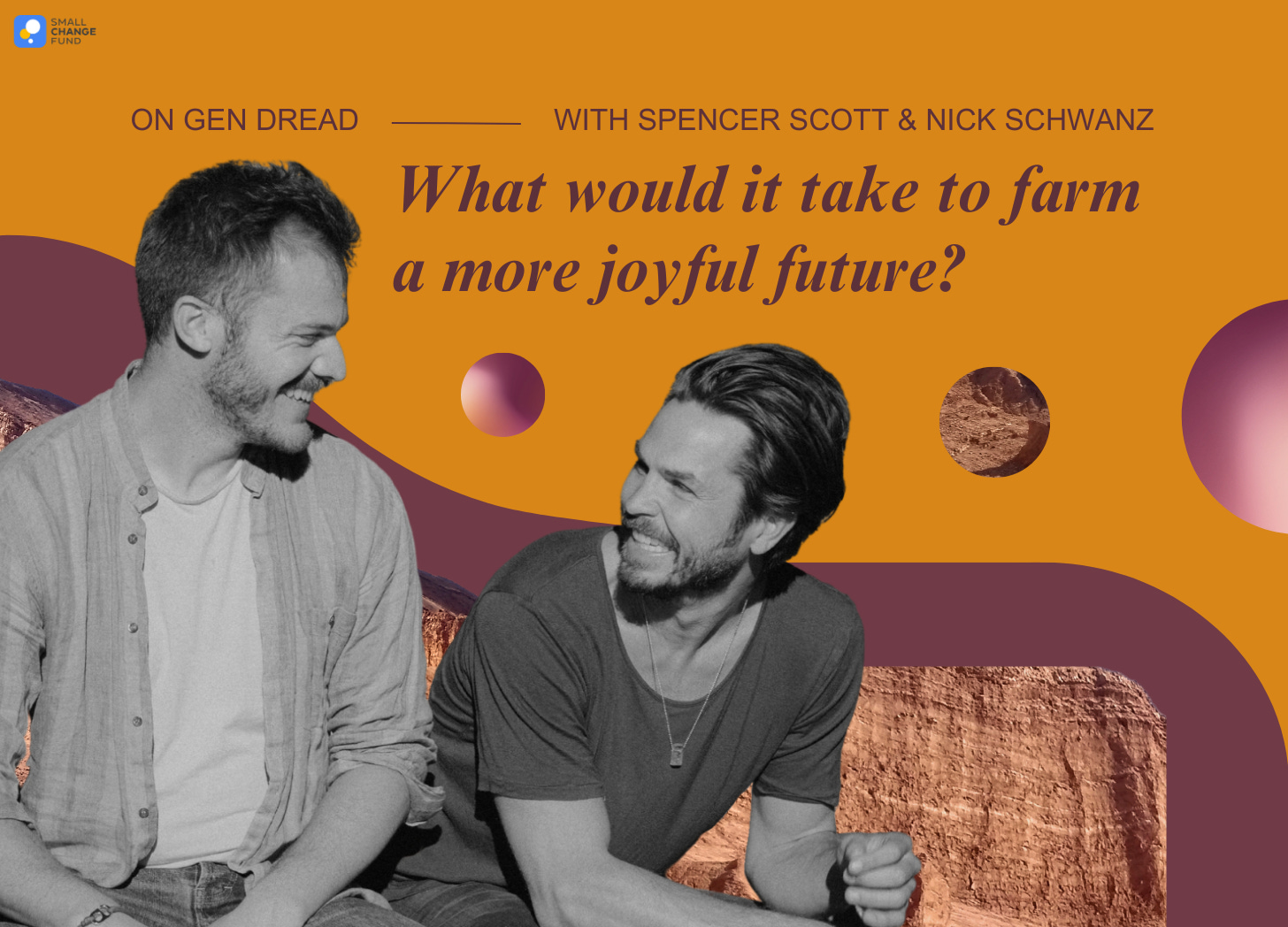
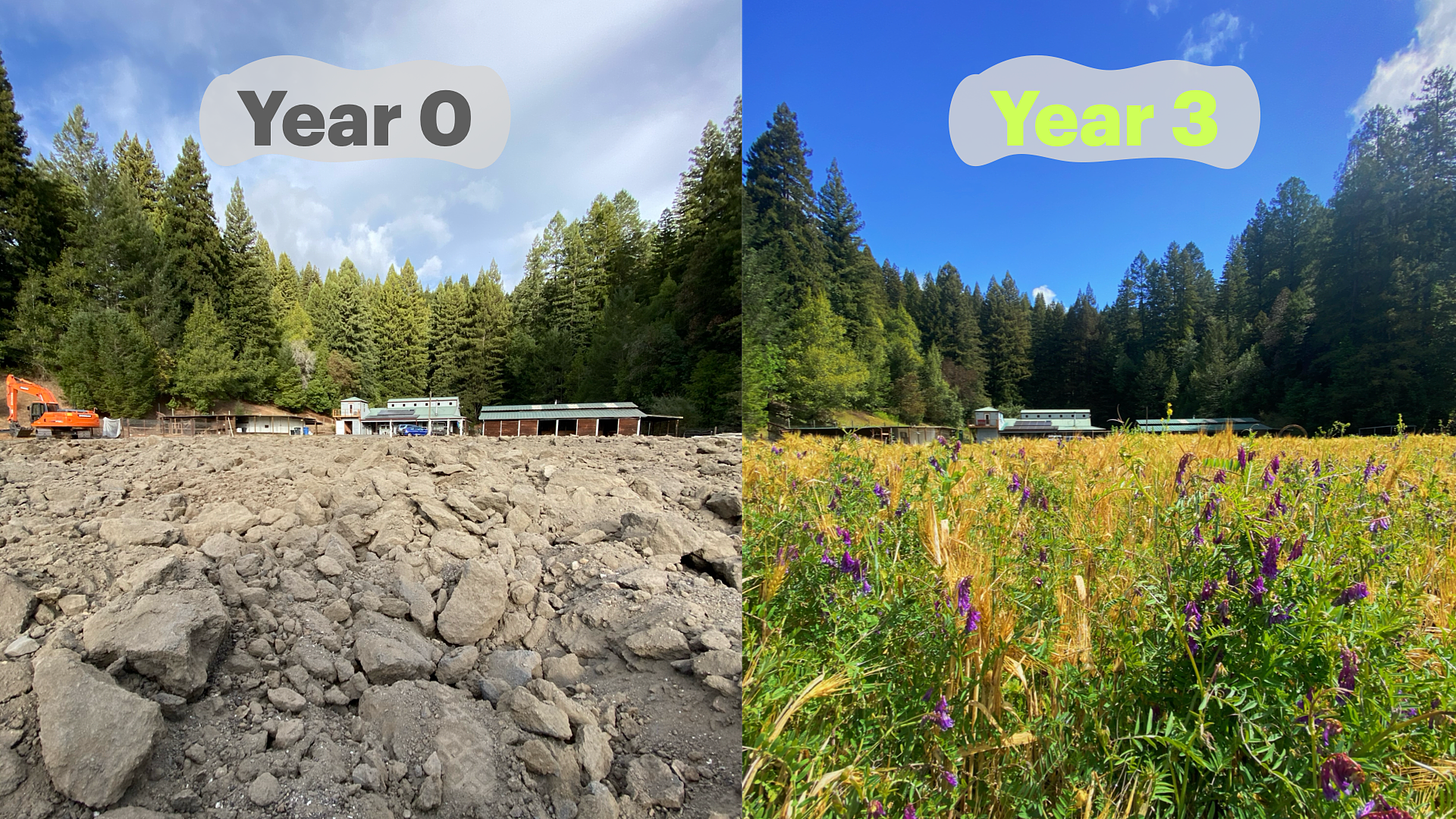
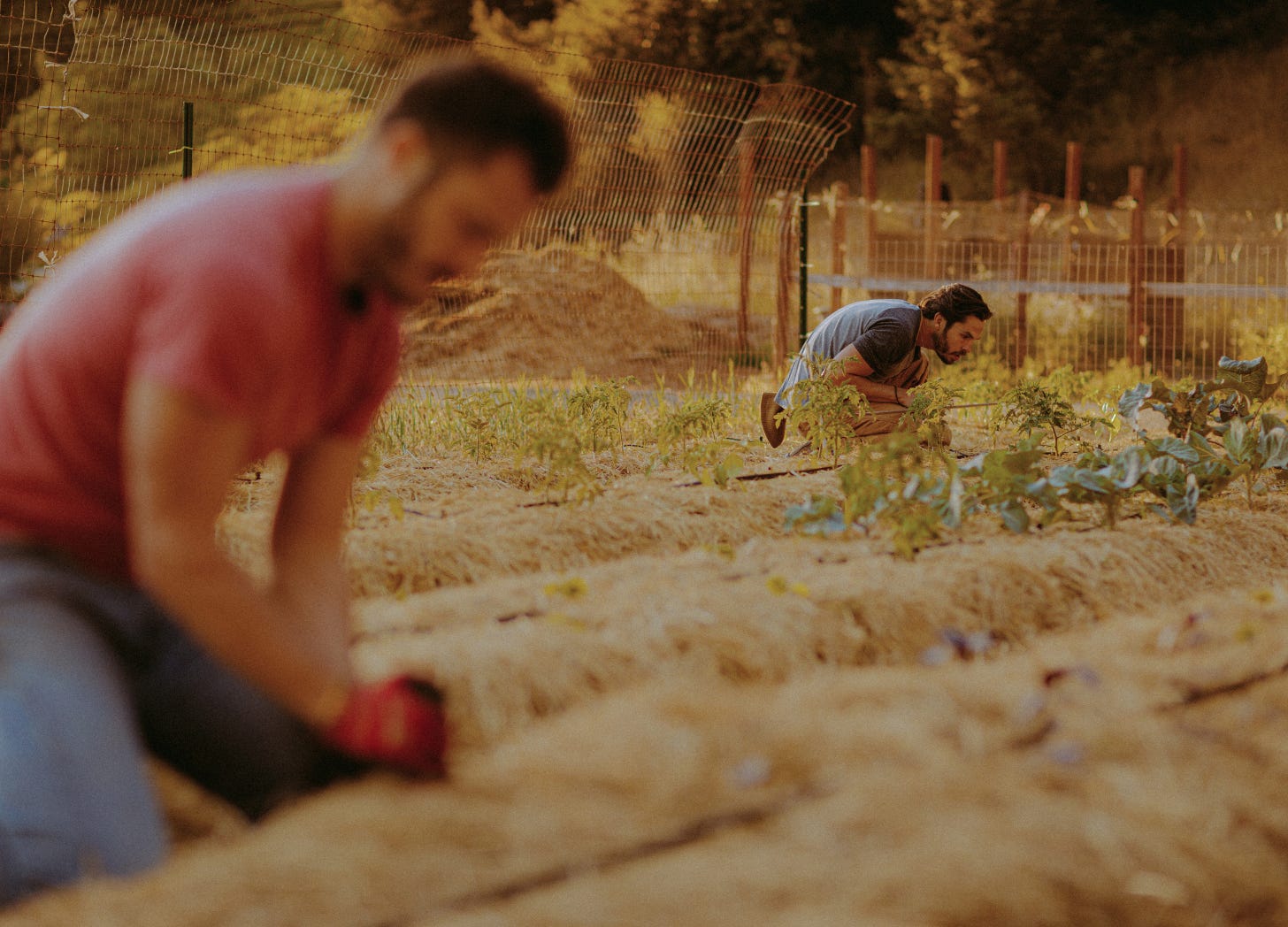
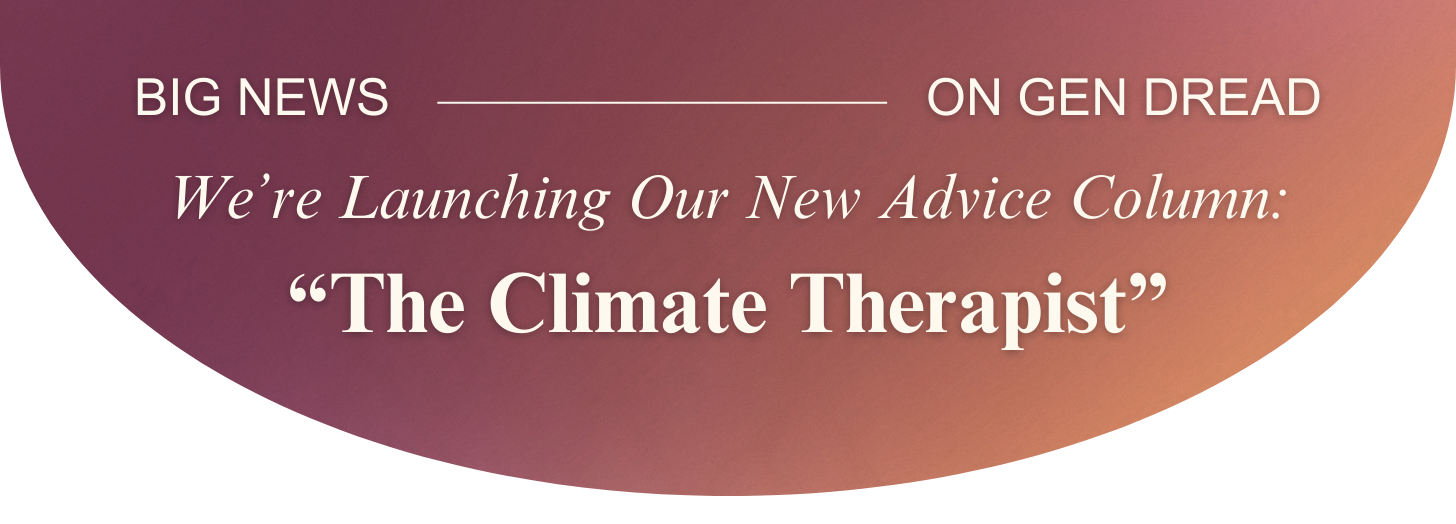
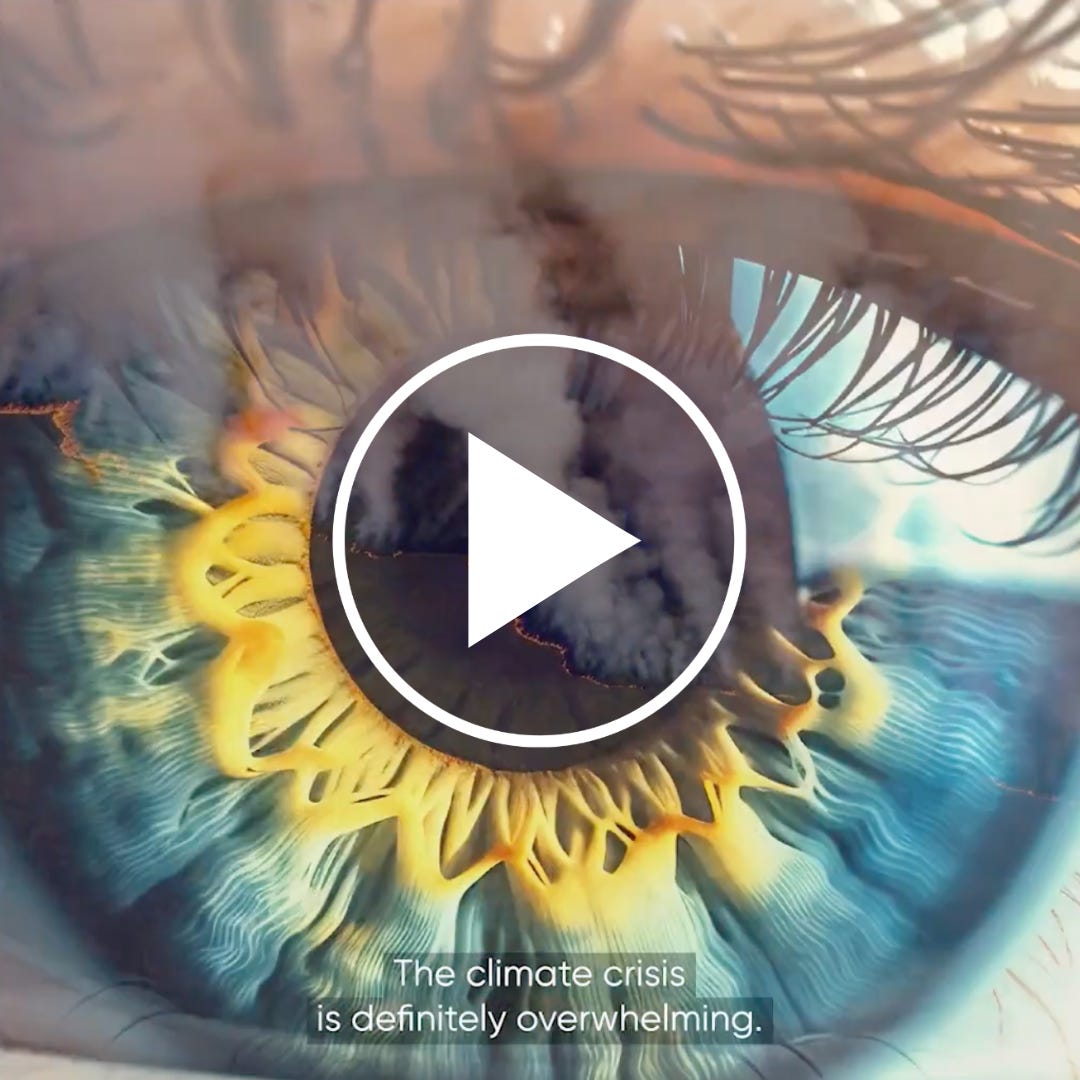
Love this idea for Solarpunk Farm! Rooted in community and love, it will flourish for years to come :-)
Very interesting idea about same sex couples working together to grow. So glad it is working well for you two!